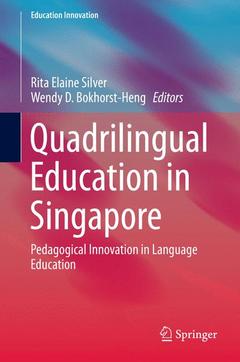Description
Quadrilingual Education in Singapore, 1st ed. 2016
Pedagogical Innovation in Language Education
Education Innovation Series
Coordinators: Silver Rita Elaine, Bokhorst-Heng Wendy D.
Language: English
Subjects for Quadrilingual Education in Singapore:
Support: Print on demand
Description
/li>Contents
/li>Biography
/li>Comment
/li>
Rita Elaine Silver is an Associate Professor in English Language and Literature, National Institute of Education, Singapore. Her specialisation is language-in-education with an emphasis on policy-classroom pedagogy-professional development connections. Her work has appeared in Language Policy, TESOL Quarterly, System,Language Teaching Research, Language in Education, Cambridge Journal of Education, and Journal of Educational Change. Previous monographs includeLanguage in Education: Social Implications (with M. Lwin, 2014); Language Learning in New English Contexts (with L. Alsagoff & C. C. M. Goh, 2009) andLanguage Learning: Home, School and Society (with C. C. M. Goh, 2007). She is co-editor of Language and Education.
Wendy Bokhorst-Hengis an Associate Professor in Education at Crandall University, Moncton, New Brunswick, Canada. Prior to her current position, she has also held positions in Singapore at the National Institute of Education, in Washington, D.C. at American University, and has directed a language program at the British Council in Beijing, China. Her research involves a focus on language policy and ideology, English as an international language, multiculturalism and diversity, and comparative education. Her work has appeared in World Englishes, Multilingua, TESOL Quarterly, Journal of Current Issues in Language Planning. She has also contributed chapters to a number of books. She has a co-authored volume with S. McKay, International English in its Sociolinguistic Contexts.



